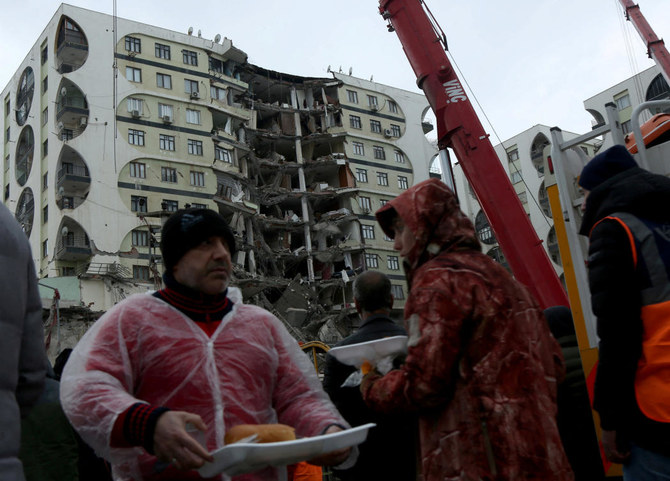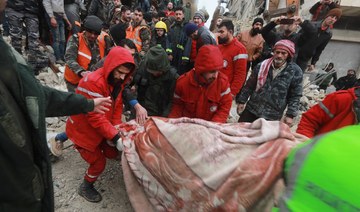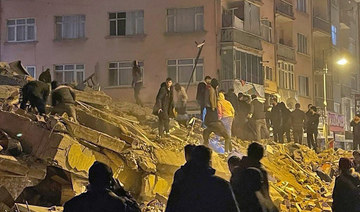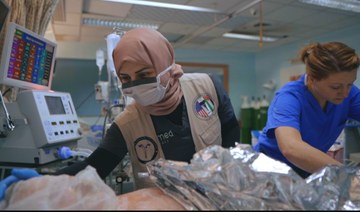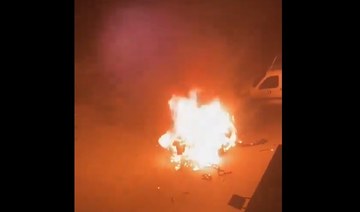PARIS: Countries around the world mobilized rapidly to send aid and rescue workers on Monday after a massive earthquake killed more than 2,300 people in Turkiye and Syria.
The pledges of assistance came from countries across Europe, Asia, the Middle East, as well as North America.
Here are some of the chief pledges of support.
The European Union has mobilized 10 search and rescue teams for Turkiye after the stricken country requested EU assistance, EU foreign policy chief Josep Borrell and EU crisis management commissioner Janez Lenarcic said.
The EU’s Copernicus satellite system has been activated to provide emergency mapping services, it said adding the bloc was ready to support those affected in Syria too.
The UN General Assembly observed a minute of silence in tribute to the victims.
“Our teams are on the ground assessing the needs and providing assistance. We count on the international community to help the thousands of families hit by this disaster, many of whom were already in dire need of humanitarian aid in areas where access is a challenge,” UN Secretary-General Antonio Guterres said.
Two of India’s National Disaster Response Force teams comprising 100 personnel with dog squads and equipment were ready to be flown to the affected area, the foreign ministry said. Doctors and paramedics with medicines were also being readied.
Prime Minister Narendra Modi said he was “anguished” and “deeply pained” by the deaths in Turkiye — with whom India has frosty relations — and Syria.
Germany — home to about three million people of Turkish origin — will “mobilize all the assistance we can activate,” Interior Minister Nancy Faeser said.
Germany’s Federal Agency for Technical Relief “can set up camps to provide shelter as well as water treatment units,” she said. Generators, tents and blankets are also being readied.
President Vladimir Putin promised to send Russian teams to both countries in telephone calls with Syria’s Bashar Assad and Turkiye’s Recep Tayyip Erdogan.
“In the nearest hours, rescuers from the Russian emergency ministry will take off for Syria,” the Kremlin said. The defense ministry said 300 military personnel deployed in Syria were helping with the clear-up effort.
Ukrainian President Volodymyr Zelensky said that his war-torn country was “ready to provide the necessary assistance to overcome the consequences of the disaster.”
Kyriakos Mitsotakis, prime minister of Turkiye’s historic rival Greece, whose relations with Ankara have suffered from a spate of border and cultural disputes, pledged to make “every force available” to aid its neighbor.
Israel’s Prime Minister Benjamin Netanyahu said he had approved the sending of aid to Syria — whose government does not recognize Israel — after receiving a request through diplomatic channels.
The government will also send humanitarian assistance to Turkiye, he said.
NATO chief Jens Stoltenberg voiced “full solidarity” with ally Turkiye, saying he was in touch with Turkiye’s top leadership and “NATO allies are mobilizing support now.”
Prime Minister Ulf Kristersson of Sweden, whose bid to join NATO is meeting Turkish resistance, sent his “deepest condolences” to Erdogan. “We stand ready to offer our support,” Kristersson tweeted.
Polish firefighters flew from Warsaw to the Turkish city of Gaziantep. “Our team will be working non-stop, 24 hours a day, in two locations,” said Andrzej Bartkowiak, chief commandant of the state fire service.
Qatar said it would send 120 rescue workers to Turkiye, alongside “a field hospital, relief aid, tents and winter supplies.”
Emirati President Sheikh Mohamed bin Zayed Al-Nahyan offered “assistance” in telephone calls with his Syrian and Turkish counterparts, Emirates News Agency reported.
Prime Minister Justin Trudeau tweeted: “our hearts go out to those who lost loved ones. Canada stands ready to provide assistance.”
President Emmanuel Macron said France stood ready to provide emergency aid to Turkiye and Syria. “Our thoughts are with the bereaved families,” he tweeted.
Foreign minister James Cleverly said the UK was sending a team of 76 search and rescue specialists, equipment and rescue dogs. Britain was also sending an emergency medical team to assess the situation on the ground.
The government in Japan — which frequently suffers earthquakes — is dispatching the Japan Disaster Relief Rescue Team to Turkiye.
Iran is ready to provide “immediate relief aid to these two friendly nations,” President Ebrahim Raisi said, offering condolences on the “heartbreaking incident.”






